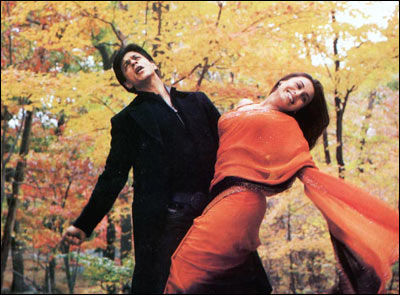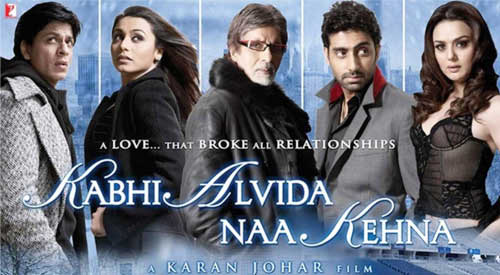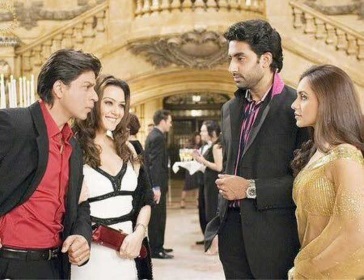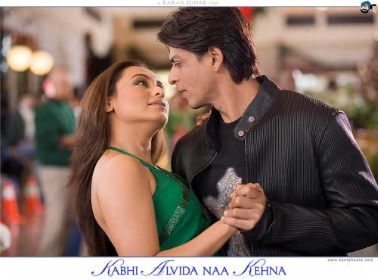

Whenever Karan Johar releases a new film
it is a very big deal and an increasingly rare event – comparable to a royal
coronation or the birth of a Panda at the National Zoo. He is the wunderkind
of the Indian film industry (34 years-old now) and news of his next film is
followed by the public with a voracious appetite for every morsel of data
or every stray rumor. Having two of the biggest films in Indian history will
cause that kind of reaction. His debut film in 1999, Kuch Kuch Hota Hai (KKHH),
is one of the most popular romances ever and his next film in 2001, Kabhi
Kushi Kabhie Gham (K3G), was an enormous box office hit. Then Johar went
silent like a submarine waiting for the depth charges to pass by. Lots of
stories circulated about various projects and directions that he wanted to
go in, but they were like wisps of smoke in the wind and one had to begin
to wonder if there was a certain trepidation on his part about his next film
– doubts that he could possibly match his earlier efforts must have hung
over him like a giant shadow.

Johar is the master of the emotional counter punch – he sets up his audience with breezy humor and likable characters and then piles on the melodrama with the force of a heavyweight boxer at the top of his game – a couple jabs to the face, stick it hard to the stomach and then a crunch to the head as your emotional façade crumbles like jelly. He could pull tears out of a desert rock. His manipulation of your emotions is obvious and nearly cruel and though you realize what is happening it doesn’t really matter because he aims at the big fat targets that affect most of us – love of family, love of country and a fated love. Though a slick feel of modernity color his films with hip fashions, discos and attitude, behind this is an adherence to traditional Indian film values - respect for your parents, faithfulness and patriotism. Both of his first two films inched out of this broad outline ever so barely – in KKHH the male character falls in love with a another woman (Kajol) after his wife has died but gets the ghostly blessing of his dead wife before doing so and in the very conservative K3G a man breaks with his parents but in the end is of course reconciled to them and the one non-traditional female (Kareena) is brought back into the fold of Indian womanliness by the end.
In Kabhi Alvida Naa Kehna (KANK) Johar seems to be attempting to go for something that breaks the ropes of tradition but in doing so he seems to have lost his magical touch – he looks uncomfortable crossing this unfamiliar terrain and the film never comes close to reaching the emotional heights of either his two previous films. One might argue that his subject material has grown up – it’s no longer Archie and Veronica in college with obvious straightforward messages of love but instead he goes for a conflicted emotional canvass where nothing is absolute – and this is very true but in doing so there is no final knockout blow – no moment in which you simply lose yourself within your weepy solitude. There is no love to cheer for and in reality no characters to root for – everyone is so flawed that you sit back and wait for them to self-destruct. This certainly makes for a much more unpredictable film than before and I found myself surprised that in the end Johar didn’t fall back into the comfort of a traditional Indian ending but instead a much more realistic one (the specific melodrama withstanding) in today’s world where very little lasts forever. A part of me admires him for taking some chances for a change, but I just wish I had liked the film more.
The film tells the story of two married
couples – NRI’s living in NYC – and in retrospect one suspects that setting
the film outside of India allowed Johar to go where he does with the story
and the moral questions that are raised. One couple is Dev (Shahrukh Khan)
and Rhea (Preity Zinta) who have been married about ten years with a small
son and from all evidence their marriage is going through a rough spot. He
had been a top football (soccer) star until an injury forced him to become
an elementary school coach, while Rhea has become a huge success in the fashion
magazine business. This change in their status causes much friction and bitterness
on Dev’s part. The other couple has been married only for a few years but
there too it appears that all is not well - Rishi (Abhishek Bachchan) is
a fun loving party animal who won’t grow up while his wife Maya (Rani Mukerjee)
wants him to settle down and become more serious. Left unstated for the most
part but clearly an underlying concern is her inability to have children.
But beneath all of this seems to be the real demon in the house – neither
Dev nor Maya are truly in love with their mates anymore and perhaps never
really were.

Dev and Maya meet cute and over time first become friends who agonize with each other over their respective marriages and slowly begin to realize that they are in love with one another – but they both try and fight off these feelings and patch up their marriages – divorce is not something they want to contemplate. Their better halves stay unaware of this growing attachment of their partners and in fact begin to believe that their marriage is working itself out. It doesn’t. And everybody lives happily ever after.
There are a couple basic elements that never allow you to fully embrace this story or the characters. The focus of the film is clearly on Dev and Maya with their spouses showing up primarily as jousting points – but they are not very likable people for the most part. In fact both Rishi and Rhea seem to be much better rounded appealing characters but instead the audience is stuck having to wallow in the self pity of the other two. Dev or Shahrukh’s characterization of him is all edges, sarcasm and anger and his well-known charm feels so brittle and bitter – probably a little like what Shahrukh is after a few drinks and a fight with his wife. It’s not a bad performance per se but it was a poorly written script that made him so one-note. I found him so unlikable that the less time I spent with him the better and it’s difficult to conceive of the sensitive and needy Maya falling for this emotionally hollow angry man. Yes, love is strange but even stranger in the movies. Maya is no prize either, as she has no sense of fun, romance or passion and is as cold a fish as one could find – all allure on the outside and frozen on the inside. This is certainly explained by the fact that she is trapped in a marriage with a good man that she can’t force herself to love as much as she wants to, but that makes her no more appealing. Again, a good performance but it is hard to give a fig for either of them and for their finding each other as “soul mates”.
The film breaks into two very definite sections
– the first half is spiced up by some comic set pieces that are in fact very
funny even if they approach sitcom territory – the scene with Rani in leather
and whip mode is rather classic but so out of character and absurd that it
feels like we jumped into another film. Their “meet cute” scene is similar
– it works because it is funny but again it felt so untrue to reality (which
is where Johar is trying to push this film) that it is almost uncomfortable
to watch. The scenes with Amitabh Bachchan playing the womanizing father
of Rishi treaded through the same strange mongrel world – his over the top
character was amusing in itself but it felt like it was written for another
film – and when he finally tones it down near the end and brings his acting
weight into the film it made me sad that we had so little of this previously
– no one today has the animal force of a serious Amitabh but as a whoring
old man it seemed a rather frivolous use of his time. At the same time these
comic moments are easily the most entertaining of the film because the love
story that evolves in the second half of the movie has the movement of oil
sludge but a lot less impact – it takes so long to go anywhere that I would
not have been surprised to have found out that Bush had invaded another country
or two in the meantime. By the end you just want them to be together – to
torture each other and not the audience. KKHH admittedly had a similar structure
– a light somewhat cartoony first half followed by a second half with a truckload
of melodrama, but it worked perfectly there because it created two characters
that you loved – here you just want them to leave you alone. Cue for Maya
to cry some more.

Another element that has made Johar’s films so strong are the musical numbers filled with memorable tunes and wonderful choreography, but again he went in another direction using Shankar-Ehsaan-Loy as his composers. At least on first go through none of the numbers seemed particularly interesting – the two big numbers were both semi-disco driven beats with MTV edits and dance moves and the others were forgettable ballads with dull picturization. The cast is top choice as is the case with all of his films – Shahrukh now being in all his three films as is Rani – and certainly bringing Abhishek and Preity into his group of favorite actors is a good thing. And let’s not forget Kajol who gives the film more zing in her small cameo than it deserved. All do fine jobs and are not to blame for this film simply not having the energy that it is missing. This film might grow on me in time, but my guess is I won’t give it many if any opportunities to do so.
My rating for this film: 5.5